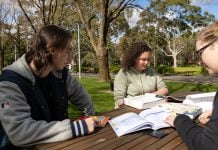Are you procrastinating on an assignment or just not sure where to begin?
The Library’s new Achieve@Uni website has a tonne of great resources and tips to help you get started.
Our best work is produced when we have time to plan, research, write and revise, so it’s important to prepare and start your assignment early.
Planning your assignment
Before starting an assignment, it’s essential you understand the nature of the assessment task and what you’re being asked to do. Get clarification from your tutor if you’re unsure.
What type of assessment task is it? There are many different types and each one will require a different structure and writing style.
Achieve@Uni can help you understand the different assessment types and how to approach each one. We can help you with reports, essays, case studies, reflective writing, literature reviews, presentations, group assessment tasks and more.
Check out the Assessments page to start planning your assignment.
Starting your research
Academic research skills are among the most important skills you can learn at uni. You can’t begin an assignment until you’ve done research.
Achieve@Uni can teach you strategies to find the best quality resources and information for your assignments. We can show you where to start, how to improve your search results and evaluate information and websites.
Check out the finding information page to get started.
Writing your assignment
Academic writing requires you to write in a particular way. It’s more formal and objective than everyday writing.
You will also need to paraphrase ideas and information from other sources. Incorrect paraphrasing can be considered plagiarism, so it’s important you learn how to do it correctly.
Achieve@Uni can help you hone your academic writing skills and teach you how to paraphrase, quote text and provide summaries.
We also highlight the most common mistakes students make while writing assignments, and how to avoid them.
Check out the writing page for more information.
Learn how to reference
We know referencing can be a drag, but that doesn’t mean it should be an afterthought. You can lose significant marks for incorrect referencing or even be picked up for plagiarism.
Referencing is important because it highlights the research you have done and provides evidence to support your argument.
It can be tricky, but once you’ve grasped it, you can gain easy marks on your assessments.
The Library’s Achieve@Uni referencing page can teach you the why, when and how of referencing.
Avoiding plagiarism
Plagiarism is one of the most common types of academic misconduct, but it’s easily avoidable.
The most surefire way to avoid plagiarism is to plan ahead and always cite your sources. It’s also important that you understand how to paraphrase correctly.
Check out the academic integrity page, where you can learn how to avoid plagiarism, as well as other types of academic misconduct.
Start your assignment with the skills you need to succeed. Visit Acheive@Uni to get started.













